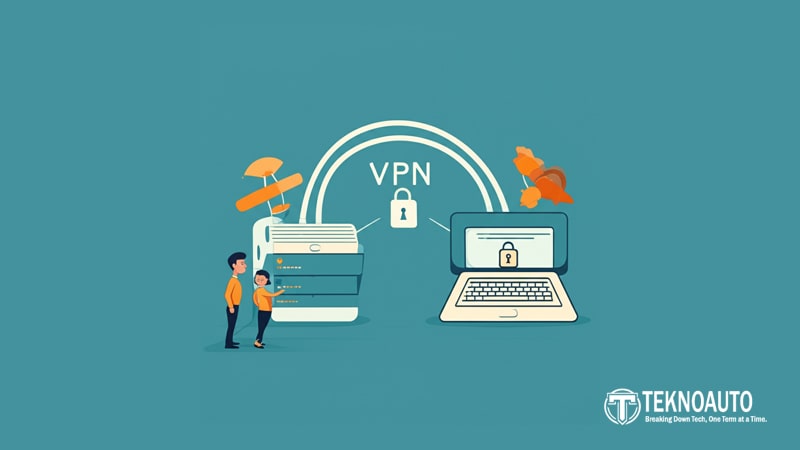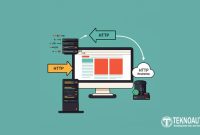In today’s interconnected world, our digital footprints are constantly expanding. Every click, search, and online transaction leaves a trace, making us vulnerable to privacy breaches and surveillance. The question of, What Does a VPN Do? Protecting Privacy in the Digital World is more relevant than ever.
A VPN, or Virtual Private Network, offers a solution by creating a secure tunnel for your internet traffic, masking your IP address, and encrypting your data. This article delves into the intricacies of VPNs, exploring their functions, benefits, and how they contribute to a safer and more private online experience.
Understanding the Core Functionality of a VPN
At its core, a VPN acts as an intermediary between your device and the internet. When you connect to a VPN server, your internet traffic is routed through an encrypted tunnel, masking your actual IP address and location. This makes it significantly harder for websites, advertisers, and even your internet service provider (ISP) to track your online activities.
IP Masking: Hiding Your Digital Identity
Your IP address is a unique identifier assigned to your device by your ISP. It reveals your approximate location and can be used to track your browsing history. A VPN masks your IP address by replacing it with the IP address of the VPN server. This makes it appear as if you are browsing from the location of the VPN server, effectively hiding your true identity and location.
Encryption: Securing Your Data in Transit
Encryption is the process of converting readable data into an unreadable format, making it incomprehensible to unauthorized parties. VPNs use strong encryption algorithms to protect your data as it travels between your device and the VPN server. This prevents hackers, eavesdroppers, and even your ISP from intercepting and reading your sensitive information, such as passwords, credit card details, and personal messages.
Key Benefits of Using a VPN
Beyond the fundamental functions of IP masking and encryption, VPNs offer a wide range of benefits that enhance your online privacy and security.
Enhanced Privacy on Public Wi-Fi
Public Wi-Fi hotspots are notorious for their lack of security. Hackers often target these networks to intercept data transmitted by unsuspecting users. A VPN encrypts your data, making it virtually impossible for hackers to steal your information, even on unsecured public Wi-Fi networks.
Bypassing Geo-Restrictions and Censorship
Many websites and streaming services impose geo-restrictions, limiting access to content based on your location. A VPN allows you to bypass these restrictions by connecting to a server in a different country. This gives you access to content that would otherwise be unavailable in your region.
Similarly, in countries with strict internet censorship, a VPN can be used to bypass censorship and access blocked websites and social media platforms.
Secure Online Banking and Transactions
When conducting online banking or making online purchases, it is crucial to protect your financial information from prying eyes. A VPN encrypts your data, ensuring that your credit card details and other sensitive information are transmitted securely, minimizing the risk of fraud and identity theft.
Preventing ISP Tracking and Throttling
Your ISP can track your online activities and use this information for various purposes, such as targeted advertising or bandwidth throttling. A VPN prevents your ISP from monitoring your browsing history and downloading habits, giving you greater control over your online privacy.
Bandwidth throttling is the practice of intentionally slowing down your internet speed for specific types of traffic, such as streaming or downloading. A VPN can prevent your ISP from throttling your bandwidth by hiding your online activities.
Anonymous Torrenting and File Sharing
Torrenting and file sharing can expose your IP address to other users, making you vulnerable to legal action or malicious attacks. A VPN masks your IP address and encrypts your traffic, providing anonymity and protecting you from potential risks associated with torrenting.
Protection Against DDoS Attacks
A DDoS (Distributed Denial of Service) attack is a type of cyberattack that floods a server with traffic, making it unavailable to legitimate users. VPNs can protect against DDoS attacks by masking your IP address and routing your traffic through multiple servers, making it more difficult for attackers to target your device.
Choosing the Right VPN: Factors to Consider
With numerous VPN providers available, selecting the right one can be a daunting task. Here are some key factors to consider when choosing a VPN:
Security Protocols and Encryption Standards
The security protocols and encryption standards used by a VPN are crucial for protecting your data. Look for VPNs that use strong encryption algorithms, such as AES-256, and support secure protocols like OpenVPN, IKEv2/IPsec, and WireGuard.
| Security Protocol | Description | Advantages | Disadvantages |
|---|---|---|---|
| OpenVPN | A highly configurable and widely used open-source protocol. | Highly secure, versatile, and compatible with various platforms. | Can be complex to set up manually. |
| IKEv2/IPsec | A fast and secure protocol often used for mobile devices. | Fast connection speeds, stable, and supports automatic reconnection. | Can be blocked by some firewalls. |
| WireGuard | A modern and lightweight protocol designed for speed and security. | Extremely fast, efficient, and easy to audit. | Relatively new, so compatibility and widespread adoption may be limited. |
| L2TP/IPsec | A legacy protocol that combines L2TP (Layer 2 Tunneling Protocol) with IPsec for encryption. | Widely supported. | Slower than other protocols and can be vulnerable to certain attacks. |
| PPTP | A very old protocol that is no longer considered secure. | Fast, but highly vulnerable and not recommended for use. | Security vulnerabilities make it unsuitable for protecting sensitive information. |
No-Logs Policy: Protecting Your Privacy
A no-logs policy means that the VPN provider does not collect or store any information about your online activities, such as browsing history, IP address, or connection timestamps. Choose a VPN provider with a strict no-logs policy to ensure that your privacy is protected.
Server Locations and Network Speed
The number and location of VPN servers can affect your connection speed and ability to bypass geo-restrictions. Choose a VPN provider with a wide range of server locations to ensure that you can connect to a server near your actual location or in the country you want to access content from.
Network speed is also an important factor to consider. A VPN can slow down your internet speed due to the encryption process. Choose a VPN provider with a fast and reliable network to minimize the impact on your browsing experience.
Jurisdiction: Where the VPN is Based
The jurisdiction of a VPN provider can have a significant impact on your privacy. VPN providers based in countries with strong data retention laws may be required to collect and store your data, even if they have a no-logs policy. Choose a VPN provider based in a country with strong privacy laws and a commitment to protecting user data.
Pricing and Subscription Plans
VPN providers offer a variety of pricing plans, ranging from free to premium. Free VPNs often have limitations, such as data caps, limited server locations, and slower speeds. Premium VPNs offer more features, faster speeds, and greater security, but they come at a cost.
Consider your needs and budget when choosing a VPN plan. A longer subscription period typically offers a lower monthly price.
Ease of Use and Customer Support
A user-friendly interface and responsive customer support can make a big difference in your VPN experience. Choose a VPN provider with an easy-to-use app and helpful customer support in case you encounter any issues.
Setting Up and Using a VPN

Setting up and using a VPN is typically a straightforward process. Most VPN providers offer apps for various devices, including computers, smartphones, and tablets.
Installing the VPN App
Download and install the VPN app from the provider’s website or app store.
Creating an Account and Logging In
Create an account with the VPN provider and log in to the app.
Connecting to a VPN Server
Choose a server location from the list and connect to the VPN server.
Verifying Your Connection
Verify that your IP address has been changed and that your data is being encrypted. You can use online tools to check your IP address and verify the encryption status of your connection.
Limitations and Considerations
While VPNs offer numerous benefits, it is important to be aware of their limitations and potential drawbacks.
Not a Silver Bullet for Online Security
A VPN is not a silver bullet for online security. It protects your data in transit, but it does not protect you from malware, phishing attacks, or other online threats. It is still important to practice safe browsing habits and use other security measures, such as antivirus software and strong passwords.
Potential for Slower Internet Speeds
As mentioned earlier, a VPN can slow down your internet speed due to the encryption process. Choose a VPN provider with a fast and reliable network to minimize the impact on your browsing experience.
Trusting Your VPN Provider
You are essentially trusting your VPN provider with your data. It is important to choose a reputable and trustworthy provider with a strong commitment to privacy.
Legality of VPN Usage
The legality of VPN usage varies depending on the country. In some countries, VPNs are legal and widely used, while in others, they are restricted or banned. It is important to be aware of the laws in your country regarding VPN usage.
VPN Use Cases: Real-World Examples
To further illustrate the benefits of using a VPN, here are some real-world examples of how individuals and organizations use VPNs to protect their privacy and security:
Journalists and Activists
Journalists and activists often use VPNs to protect their identities and communications when reporting on sensitive topics or working in oppressive regimes. A VPN can help them avoid surveillance and censorship, allowing them to communicate securely with sources and publish their work without fear of reprisal.
Remote Workers
Remote workers often use VPNs to connect securely to their company’s network and access sensitive data. A VPN encrypts their traffic, protecting it from eavesdropping and ensuring that their data is transmitted securely, even on public Wi-Fi networks.
Travelers
Travelers often use VPNs to access content that is geo-restricted in their current location. For example, they can use a VPN to watch their favorite streaming services or access websites that are blocked in the country they are visiting.
Businesses
Businesses use VPNs to protect their data and communications, especially when employees are working remotely or traveling. A VPN can help them comply with data privacy regulations and protect their sensitive information from cyberattacks.
Advanced VPN Features and Configurations
Beyond the basic functionality, some VPN providers offer advanced features and configurations that can further enhance your privacy and security.
Double VPN
Double VPN, also known as multi-hop VPN, routes your traffic through two VPN servers instead of one, providing an extra layer of encryption and anonymity. This makes it even more difficult for anyone to trace your online activities back to you.
Onion Over VPN
Onion Over VPN combines the Tor network with a VPN, providing enhanced anonymity and security. The Tor network routes your traffic through multiple relays, making it extremely difficult to trace your IP address.
Split Tunneling
Split tunneling allows you to choose which traffic is routed through the VPN and which traffic is routed through your regular internet connection. This can be useful for tasks that require high bandwidth or low latency, such as online gaming or streaming, while still protecting your privacy for sensitive activities.
Kill Switch
A kill switch automatically disconnects your internet connection if the VPN connection drops, preventing your data from being exposed. This is an important feature for ensuring that your privacy is protected at all times.
Dedicated IP Address
A dedicated IP address is an IP address that is assigned exclusively to you. This can be useful for accessing websites that block shared IP addresses or for hosting a website or server.
The Future of VPNs: Trends and Developments
The VPN industry is constantly evolving, with new technologies and features emerging to meet the growing demand for online privacy and security. Here are some trends and developments that are shaping the future of VPNs:
Increased Focus on Privacy
As awareness of online privacy issues grows, VPN providers are increasingly focused on providing enhanced privacy features and strengthening their no-logs policies.
Integration with Other Security Tools
VPNs are increasingly being integrated with other security tools, such as antivirus software and firewalls, to provide a comprehensive security solution.
Adoption of New Technologies
VPN providers are adopting new technologies, such as WireGuard and quantum-resistant encryption, to improve the speed and security of their services.
Expansion into New Markets
VPNs are expanding into new markets, such as IoT devices and smart homes, to protect the privacy of connected devices.
Debunking Common VPN Myths
There are several misconceptions surrounding VPNs. Let’s address some of the most common myths:
- Myth: VPNs make you completely anonymous online.
Reality: While VPNs significantly enhance your privacy, they don’t guarantee complete anonymity. Other factors, such as browser cookies and website tracking, can still reveal your identity.
- Myth: Free VPNs are just as good as paid VPNs.
Reality: Free VPNs often come with limitations, such as slower speeds, data caps, and limited server locations. They may also collect and sell your data to third parties.
- Myth: VPNs are only for illegal activities.
Reality: VPNs are used by a wide range of individuals and organizations for legitimate purposes, such as protecting privacy, bypassing geo-restrictions, and securing online transactions.
- Myth: VPNs are too complicated for the average user.
Reality: Most VPN providers offer user-friendly apps that are easy to set up and use, even for those with limited technical knowledge.
Conclusion: Taking Control of Your Online Privacy
In conclusion, What Does a VPN Do? Protecting Privacy in the Digital World is answered by understanding that it’s a powerful tool for protecting your online privacy and security. By masking your IP address, encrypting your data, and bypassing geo-restrictions, a VPN can help you take control of your online experience and protect your sensitive information from prying eyes.
While VPNs are not a perfect solution, they are an essential component of a comprehensive online security strategy. By choosing the right VPN provider and practicing safe browsing habits, you can significantly enhance your online privacy and enjoy a safer and more secure online experience. As the digital landscape continues to evolve, VPNs will undoubtedly play an increasingly important role in protecting our privacy and security in the digital world.



